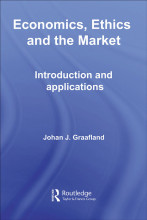The theory of perfect markets
5 important questions on The theory of perfect markets
First welfare theorem
Second welfare theorem
Arguments defending the ideal of perfect markets (Hausman)
- moral principle of minimal benevolence
- competitive equilibriums are Pareto-efficient
- All Pareto- efficient states of affairs can be obtained as competitive general equilibria given the right initial distribution of endowments to individuals
--> perfectly competitive economies morally desirable, market failures morally bad
- Higher grades + faster learning
- Never study anything twice
- 100% sure, 100% understanding
Doubts perfect markts/competition
- welfare theorem is based on Pareto criterion, is subject to moral criticisms
- second welfare theorem does not always meet the Pareto criterion (incoherent with principles that underpin the first welfare theorem)
- institutional reforms may be inconsistent with the Pareto criterion
- information needed to calculate the required initial distribution of endowments is very hard to get
- politically very difficult to redistribute resouces among people by non-distorting taxes
Perfect competitive markets satisfy efficiency in 3 aspects:
- efficiency in the use of different production factors
- effiency in output
The question on the page originate from the summary of the following study material:
- A unique study and practice tool
- Never study anything twice again
- Get the grades you hope for
- 100% sure, 100% understanding
































